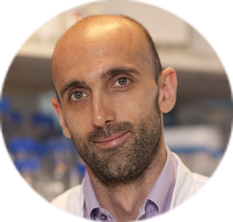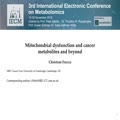
The 3rd International Electronic Conference on Metabolomics
Part of the International Electronic Conference on Metabolomics series
15–30 November 2018
Microbiota and Metabolomics, Pathway Mapping and Fluxomics, Advanced Metabolomics and Data Analysis Approaches
- Go to the Sessions
- Event Details
Welcome from the Chairs
| 15–30 November 2018 |
Venue: Online
Cost: No registration fee; no need to travel
The 3rd International Electronic Conference on Metabolomics will be held from 15-30 November 2018 in an online environment. The objective of this event is to bring researchers working in the field onto a common platform where they can present and discuss their recent research without the need to travel.
This year, Metabolites would like to award the Best Presentation as selected by an evaluation committee. The winner will be offered publication of the extended full manuscript FREE of charge in the Special Issue of Metabolites together with a certificate. After the conference, the authors are also welcome to submit an extended version of the proceeding papers to the Special Issue of Journal Metabolites and receive a 20% discount off the Article Processing Charge.
Key Dates:
- Conference Open: 15 - 30 Nov. 2018
Main Topics:
- Section A: Advanced Metabolomics and Data Analysis Approaches
- Section B: Identification of Unknowns
- Section C: Precision Nutrition and Food Specific Profiles
- Section D: Microbiota and Metabolomics
- Section E: Pathway Mapping and Fluxomics
Sincerely yours,
Prof. Peter Meikle
Dr. Thusitha W. Rupasinghe
Prof. Susan Sumner
Dr. Katja Dettmer-Wilde
Conference Chairs
Keynote Speakers
 |
Topic: Defining Complex Drug Mechanisms with MetabolomicsDr. Darren CreekMonash University, Australia(Video) |
Biography: Dr. Darren Creek is a Senior Lecturer and NHMRC Career Development Fellow at the Monash Institute of Pharmaceutical Sciences, and is Director of the Metabolomics Node of the Monash Proteomics and Metabolomics Facility. He completed his PhD at Monash University in 2007, and performed post-doctoral research in Uganda, Scotland and Australia working on antimalarial drug discovery and clinical trials, before focusing on metabolomics studies of tropical parasites. He developed several novel analytical methods and software tools for the metabolomics field, and discovered novel pathways and drug mechanisms in protozoan parasites. Dr Creek’s laboratory currently uses metabolomics and proteomics to understand mechanisms of drug action and resistance for infectious diseases, with a major focus on African trypanosomiasis and malaria. In 10 years since completion of his PhD, Darren has over 75 publications, 10 grants and fellowships from NHMRC, ARC and NIH, and was recently a Director of the International Metabolomics Society.
 |
Topic: Mitochondrial Dysfunction and Cancer: Metabolites and Beyond (Video)
Dr. Christian FrezzaUniversity of Cambridge, UK
|
Biography: Dr. Christian Frezza is an MRC Programme Leader at the MRC Cancer Unit, University of Cambridge. He studied Medicinal Chemistry at the University of Padova, Italy, and gained his MSc in 2002, after a period of research on mitochondrial toxicity induced by photoactivable anticancer drugs. Christian then joined the laboratory of Luca Scorrano in Padova to start a PhD on mitochondrial dynamics and apoptosis. In 2008, he moved to the Beatson Institute of Cancer Research in Glasgow as recipient of an EMBO Long Term Fellowship, where he investigated the role of mitochondrial defects in tumorigenesis. He moved to the MRC Cancer Unit in 2012, to take up his current position. Christian’s research is focused on understanding the role of altered metabolism in cancer, particularly investigating how small molecule metabolites affect the process of tumorigenesis. The major goal of his team is to exploit this knowledge to pioneer novel tools for cancer diagnosis and therapy.
 |
|
Biography: Dr. Peter D. Karp is the director of the Bioinformatics Research Group within the Artificial Intelligence Center at SRI International. Dr. Karp has authored more than 160 publications in bioinformatics and computer science in areas including metabolic pathway bioinformatics, computational genomics, scientific visualization, and scientific databases. He is a Fellow of the American Association for the Advancement of Science and of the International Society for Computational Biology. He received the Ph.D. degree in Computer Science from Stanford University in 1989, and was a postdoctoral fellow at the NIH National Center for Biotechnology Information.
 |
Topic: Computational Tools for the Identification of UnknownsProf. Dr. David S. WishartUniversity of Alberta, Canada |
 |
|
Biography: Oliver Jones is an associate professor of analytical chemistry based at RMIT University in Melbourne. He obtained his MSc and PhD from Imperial College London in 2005 and then held a postdoctoral fellowship in biochemistry at the University of Cambridge until 2009. Oliver then worked at the University of Durham before moving to RMIT in 2012. Oliver’s group conducts research in chromatography and NMR, for a range of applications, predominantly metabolomics and the trace analysis of environmental pollutants. At RMIT he is Deputy Director of both the Water: Effective Technologies & Tools Research Centre and the Environmental Sustainability & Remediation Centre. He also recently developed a mobile app “Chirality-2” to help teach Chemistry. He is currently (2015-date) a member of the Australian Academy of Science National Committee for Chemistry. He is president of the Australian and New Zealand Metabolomics Network; secretary and board member of the Australian and New Zealand Society for Magnetic Resonance and a board member of the Metabolomics Society. Oliver has won several awards including the 2015 ANZMAG Sir Paul Callaghan Medal and the RMIT College of Science Engineering and Health Media Star Award. He has been an invited speaker at several conferences and have helped organise many others (he was a member of the organising committee of the 2017 Metabolomics Conference). He has over 86 peer-reviewed publications, with 3987 total citations and an h-index of 27.
 |
Topic: Identifying Sex Differences in Colon Cancer Metabolism (Video)Dr. Caroline H. JohnsonYale University, USA |
Biography: Caroline H. Johnson, PhD, is Assistant Professor of Epidemiology in the Department of Environmental Health Sciences at Yale School of Public Health. She graduated from Imperial College London in 2009 with a PhD in Analytical Chemistry. Since then she has held postdoctoral and staff appointments at the National Cancer Institute and The Scripps Research Institute. Dr. Johnson's research uses mass spectrometry-based metabolomics to understand the role of metabolites in human health. Her primary research interest is to investigate the relationship between genetic and environmental influences (diet, hormones and microbiome) in colon cancer. She is also examining exposures during pregnancy.
Keynote Presentations
-

[KEYNOTE] Mitochondrial dysfunction and cancer: metabolites and beyond (Video)
By
-

[KEYNOTE] Computational Tools for the Identification of Unknowns (Video)
By
-

[KEYNOTE] Identifying sex differences in colon cancer metabolism (Video)
By
, , , , -

[KEYNOTE] Illuminating the Dark Metabolome (Video)
By
-

[KEYNOTE] Defining complex drug mechanisms with metabolomics (Video)
By
, , ,
List of accepted submissions (20)
| Id | Title | Authors | Presentation Video | Poster PDF | |||||||||||||||||||||||||||||||||||||
|---|---|---|---|---|---|---|---|---|---|---|---|---|---|---|---|---|---|---|---|---|---|---|---|---|---|---|---|---|---|---|---|---|---|---|---|---|---|---|---|---|---|
| sciforum-021429 | [KEYNOTE] Mitochondrial dysfunction and cancer: metabolites and beyond (Video) |

|

|
Show Abstract |
|||||||||||||||||||||||||||||||||||||
|
Although several lines of evidence have implicated mitochondrial dysfunction in cancer aetiology, it is still unclear how and to what extent the dysregulation of mitochondrial function contributes to the behaviour of cancer cell. Today I will present some recent results obtained using a cell model with defined levels of mitochondrial DNA mutation, mTUNE, to investigate the direct consequences of mitochondrial dysfunction. We found that impaired utilization of reduced nicotinamide adenine dinucleotide (NADH) by the mitochondrial respiratory chain leads to cytosolic reductive carboxylation of glutamine as a new mechanism for cytosol-confined NADH recycling supported by malate dehydrogenase 1 (MDH1). We also observed that increased glycolysis in cells with mitochondrial dysfunction is associated with increased cell migration in an MDH1-dependent fashion. Our results elucidate a novel link between mitochondrial dysfunction and cancer metabolism, associated with changes in cell behaviour. Video from the Keynote Speaker Dr. Christian Frezza can be found as below: |
|||||||||||||||||||||||||||||||||||||||||
| sciforum-021705 | Annotation of phospholipids in mass spectrometry-based metabolomics | N/A |

|
Show Abstract |
|||||||||||||||||||||||||||||||||||||
|
Phospholipids play numerous roles in biological systems, including the formation of membrane lipid bilayers and the signaling of multiple biological pathways, so that their dyshomeostasis have been associated with the development of multiple diseases, such as Alzheimer’s disease and cancer. Metabolomics based on mass spectrometry has been largely employed to investigate these disease-related perturbations in the phospholipidome. However, the annotation of discriminant features still remains as a major bottleneck in the metabolomic pipeline. Chemical standards of individual phospholipid species are normally not commercially available due to the large number of isomers, so the knowledge of their characteristic fragmentation patterns upon tandem mass spectrometry is of great utility for their annotation (1). In this work, we provide a simplified guideline for the MS/MS-based identification of the most important phospholipid classes and their fatty acid composition. (1) R. González-Domínguez. Metabolomic approaches for phospholipid analysis: advances and challenges. Bioanalysis 10 (2018) 1069-1071 |
|||||||||||||||||||||||||||||||||||||||||
| sciforum-021706 | Application of targeted and non-targeted approaches to investigate the effect of genotype and growing conditions on the strawberry metabolome | , , | N/A |

|
Show Abstract |
||||||||||||||||||||||||||||||||||||
|
Strawberry is composed of numerous primary metabolites (sugars, amino acids, organic acids) and secondary metabolites (anthocyanins, flavan-3-ols, phenolic acids), which play an essential role in fruit quality, organoleptic characteristics and healthy benefits. In this context, metabolomics presents a great potential to get a deep overview of this complex chemical meshwork, which can provide valuable information on the effect of multiple growing factors in the strawberry composition. In this work, we show the utility of different metabolomic approaches to investigate the influence of variety and agronomic conditions in the strawberry metabolome on the basis of data acquired in two published studies conducted in our research group. First, we conducted a GC/MS-based non-targeted metabolomic analysis in strawberries of three varieties with different sensitivity to environmental conditions (Camarosa, Festival and Palomar), which in turn were grown in soilless systems by using various agronomic conditions (electrical conductivity, coverage and substrates) (1). Complementarily, a targeted metabolomic approach based on UHPLC-MS/MS was also applied to identify and quantitate the main polyphenol compounds in these strawberry fruits (2). The most discriminant metabolites were several amino acids, sugars, organic acids, anthocyanins, ellagic acid derivatives, flavan-3-ols, chlorogenic acid and quercetin 3-O-glucuronide, which could be associated with differences in organoleptic characteristics and the biosynthesis of strawberry antioxidants. (1) I. Akhatou, R. González-Domínguez, A. Fernández-Recamales. Investigation of the effect of genotype and agronomic conditions on metabolomic profiles of selected strawberry cultivars with different sensitivity to environmental stress. Plant Physiol. Biochem. 101 (2016) 14-22 (2) I. Akhatou, A. Sayago, R. González-Domínguez, Á. Fernández-Recamales. Application of targeted metabolomics to investigate optimum growing conditions to enhance bioactive content of strawberry. J. Agric. Food Chem. 65 (2017) 9559-9567 |
|||||||||||||||||||||||||||||||||||||||||
| sciforum-021707 | Comparison of complementary statistical analysis approaches in metabolomic food traceability | , , | N/A |

|
Show Abstract |
||||||||||||||||||||||||||||||||||||
|
Metabolomics generates large datasets that require the use of advanced and complementary statistical tools in order to extract the maximum amount of useful information. Traditionally, various non-supervised and supervised pattern recognition methods have been employed in food traceability and authentication, including principal component analysis (PCA), partial least squares discriminant analysis (PLS-DA) or soft independent model class analogy (SIMCA), among others. Complementarily, the use of new machine learning algorithms is emerging in food metabolomics during the last years due to their excellent performance for the analysis of complex datasets, such as random forest (RF) and support vector machines (SVM). In this work, we show the advantages, limitations and complementarities of these statistical tools in food analysis, on the basis of data acquired in various traceability studies performed in our research group with strawberry and extra virgin olive oil (1-4). (1) I. Akhatou, R. González-Domínguez, A. Fernández-Recamales. Investigation of the effect of genotype and agronomic conditions on metabolomic profiles of selected strawberry cultivars with different sensitivity to environmental stress. Plant Physiol. Biochem. 101 (2016) 14-22 (2) I. Akhatou, A. Sayago, R. González-Domínguez, Á. Fernández-Recamales. Application of targeted metabolomics to investigate optimum growing conditions to enhance bioactive content of strawberry. J. Agric. Food Chem. 65 (2017) 9559-9567 (3) A. Sayago, R. González-Domínguez, R. Beltrán, Á. Fernández-Recamales. Combination of complementary data mining methods for geographical characterization of extra virgin olive oils based on mineral composition. Food Chem. 261 (2018) 42–50 (4) A. Sayago, R. González-Domínguez, J. Urbano, Á. Fernández-Recamales. Combination of vintage and new-fashioned analytical approaches for varietal and geographical authentication of olive oils. Under preparation |
|||||||||||||||||||||||||||||||||||||||||
| sciforum-021741 | Detection of metabolite corona on amino functionalised polystyrene nanoparticles and its implications in freshwater organisms | , , , | N/A |

|
Show Abstract |
||||||||||||||||||||||||||||||||||||
|
Protein corona formation on nanoparticles (NPs), affect NP physicochemical properties, cellular uptake and toxicity, and has been reported extensively. To date, studies of the occurrence and potential importance of small molecule (metabolite) coronas are limited. We sought to determine such a corona using high-sensitivity metabolomics combined with a well-established model system for freshwater ecotoxicology (Daphnia magna feeding on Chlorella vulgaris) and amino functionalised polystyrene NPs (NH2-pNPs). Initially, we optimised our method using a targeted LC-MS/MS approach for sodium dodecylsulphate (SDS) as an analogue to signalling molecules that are known to occur in our freshwater model system. Following, we performed an untargeted discovery metabolomics study – using high-sensitivity nanoelectrospray direct infusion mass spectrometry (DIMS) for the unbiased assessment of the metabolite corona of NH2-pNPs in the freshwater model system. Untargeted DIMS metabolomics reproducibly detected 100s of small molecule peaks extracted from the NH2-pNPs when exposed to conditioned media from the D. magna-C. vulgaris model system. Attempts to annotate these extracted metabolites, including through the application of van Krevelen and Kendrick Mass Defect plots, indicate a diverse range of metabolites that were not clustered into any particular class. Overall, we demonstrate the existence of an ecologically relevant metabolite corona on the surface of NPs through application of a high-sensitivity, untargeted mass spectrometry metabolomics workflow. |
|||||||||||||||||||||||||||||||||||||||||
Event Awards
Best Presentation Award
The Awards
Number of Awards Available: 1
The winner will be offered publication of the extended full manuscript free of change in the Special Issue of Metabolites together with a Certificate.Terms and Conditions:
This year, as a sponsor, Metabolites would like to award the best presentation as selected by an evaluation committee. The winner will be offered publication of the extended full manuscript free of charge in a Special Issue of Metabolitestogether with a certificate.
We look forward to receiving your contributions.
- Full PPT presentation must be submitted to IECM-3
- Originality / Novelty of the paper
- Significance of Content
- Scientific Soundness
- Interest to the readers
- English language and style
Evaluation
- Each Evaluation Committee member will give an assessment for each applicant in terms of the criteria outlined above.
- Total score for each presentation will be ranked, from highest to lowest.
- If two or more students get the same score, further evaluation will be carried out.
- All decisions made by the Evaluation Committee are final.
Instructions for Authors
Submissions should be done by the authors online by registering with www.sciforum.net, and using the "Start New Submission" function once logged into system.
- Researchers interested in attending the conference must submit the abstract, on this website and no later than 30 October 2018.
- The Conference Committee will pre-evaluate, based on the submitted abstract, whether a contribution from the author fits in the scope of The 3rd International Electronic Conference on Metabolomics. All authors will be notified about the acceptance of their abstract.
- After the abstract is accepted by the Scientific Committee, the authors will be invited to prepare a full description of their work preferably under the form of a PowerPoint and/or video presentation, and to upload it before 5 November 2018 to ensure final check.
- The presentations will be accessible on https://sciforum.net/conference/iecm-3 during the conference time.
- After the conference, the authors are also welcome to submit an extended version of the proceeding papers to the Special Issue of Journal Metabolites with a 20% discount off the Article Processing Charge.
Authors are encouraged to prepare a power point presentation using the template provided by the Conference (see download below). Slides will be displayed directly in the website using Sciforum.net's proprietary slides viewer. They can be prepared in the same way as for any traditional conference where research results can be presented. Slides should be converted to the PDF format before submission so that our process can easily and automatically convert them for online displaying.
![]() International Electronic Conference on Metabolomics PPT template file
International Electronic Conference on Metabolomics PPT template file
![]() International Electronic Conference on Metabolomics Poster template file
International Electronic Conference on Metabolomics Poster template file
Authors are also welcome to submit video presentations. If you are interested in submitting, please contact the conference organizer (iecm@mdpi.com or verna.zheng@mdpi.com) to get to know more about the procedure.
Tips for authors: If you would like to prepare a video (15-20 minutes) based on your PPT presentation, you may use the "record slide" function in the PowerPoint. After recording, you can save the file as type: MPEG-4 Viedo (*.mp4).
It is the authors' responsibility to identify and declare any personal circumstances or interests that may be perceived as inappropriately influencing the representation or interpretation of clinical research. If there is no conflict, please state here "The authors declare no conflict of interest." This should be conveyed in a separate "Conflict of Interest" statement preceding the "Acknowledgments" and "References" sections at the end of the manuscript. Financial support for the study must be fully disclosed under "Acknowledgments" section. It is the authors' responsibility to identify and declare any personal circumstances or interests that may be perceived as inappropriately influencing the representation or interpretation of clinical research.
Copyright ![]()
MDPI, the publisher of the Sciforum.net platform, is an open access publisher. We believe that authors should retain the copyright to their research works. Hence, by submitting a contribution to this conference, the authors retain the copyright of their contribution, but they grant MDPI AG the non-exclusive right to publish this contribution online on the Sciforum.net platform. This means the authors can easily submit their contribution to any scientific journal at a later stage and transfer the copyright to its publisher (if required by that publisher).
Call for Papers
We thank you in advance for your presence at this conference and your contribution to its success.
Conference Chairs

Metabolomics Laboratory NHMRC, Baker Heart and Diabetes Institute, Melbourne, Victoria 3004, Australia

Metabolomics Australia, School of BioSciences, The University of Melbourne, Parkville, Victoria, Australia

Nutrition Research Institute, Department of Nutrition at the University of North Carolina at Chapel Hill, USA
Conference Committee

Bioinformatics Group, Department of Plant Sciences, Wageningen University, Wageningen, The Netherlands

International Agency for Research on Cancer (IARC), France

University of Utah, 20 South 2030 East, Salt Lake City, UT 84112, USA

Cancer Research UK Cambridge Institute, University of Cambridge, Robinson way, Cambridge CB2 ORE, UK

Cellular Biochemistry & Metabolomics, Institute of Biochemistry, University of Greifswald, Felix-Hausdorff-Strasse 4, 17489 Greifswald, Germany

McGill University, Montreal, QC H3A 0G4, Canada

Centre for Advanced Imaging, University of Queensland, Brisbane QLD 4072, Australia

Genetics and Molecular Pathology, SA Pathology (at Women's and Children's Hospital), Adelaide, Australia

University of Georgia, USA

Department of Food Science and Nutrition, University of Minnesota, St. Paul, MN 55108, USA

Department of Agrofood, Environmental and Animal Sciences, University of Udine, Udine, Italy
Organizing Committee
Dr. Shu-Kun Lin, MDPI, Basel, Switzerland
Dr. Franck Vazquez, MDPI , Basel, Switzerland
Ms. Cherise He, MDPI Branch Office, Wuhan, China
Ms. Verna Zheng, MDPI Branch Office, Wuhan, China
A. Advanced Metabolomics and Data Analysis Approaches
- Bioinformatics
- Data processing
- Data analysis
- Data integration
- Data visualization
- Mass spectrometry
- Mass spectrometry fragmentation
- Metabolome mining
- Metabolic modelling
- Metabolic regulation
- Metabolic interactions
- NMR
- Genome-scale metabolic models
- Computational biology
- Ion mobility spectrometry
- Quantitative metabolomics
- Stable isotope analysis
Session Chair
 |
Wageningen University, The Netherlands |
 |
International Agency for Research on Cancer (IARC), France |
This Session is sponsored by
Session Chairs
Dr. Justin van der Hooft, Bioinformatics Group, Department of Plant Sciences, Wageningen University, Wageningen, The Netherlands
Dr. Reza Salek, International Agency for Research on Cancer (IARC), France
Show all published submissions (6) Hide published submissions (6)
Submissions
List of Papers (6) Toggle list
B. Identification of Unknowns
- Systems biology
- Metabolic modelling
- Structure Elucidation
- Metabolite structure identification
- Metabolite identification
 |
University of Queensland, Australia |
 |
Genetics and Molecular Pathology, SA Pathology (at Women's and Children's Hospital), Australia |
 |
University of Georgia, USA |
This Session is sponsored by
Session Chairs
Dr. Horst Joachim Schirra, Centre for Advanced Imaging, University of Queensland, Australia
Dr. Maria Fuller, Genetics and Molecular Pathology, SA Pathology (at Women's and Children's Hospital), Adelaide, Australia
Dr. Arthur S. Edison, University of Georgia, USA
Show all published submissions (4) Hide published submissions (4)
Submissions
List of Papers (4) Toggle list
C. Precision Nutrition and Food Specific Profiles
- Metabolomics
- Mass spectrometry
- Plant science
- Food science
- Nutrition
- Bioinformatics
- Nutritional metabolomics
- Food chemistry
- Diet and health
- Metabolomics in nutrition science
- Advanced NMR and mass spectrometry in food science
This session is chaired by: Dr. Susan Sumner , Dr. James E. Cox, Dr. Devin Benheim and Dr. Chi Chen
Section Chair
 |
University of North Carolina at Chapel Hill, USA |
 |
University of Utah, USA |
 |
University of Minnesota, USA |
This Session is sponsored by
Session Chairs
Dr. Susan Sumner, Nutrition Research Institute, Department of Nutrition at the University of North Carolina at Chapel Hill, USA
Dr. James E. Cox, University of Utah, Salt Lake City, UT 84112, USA
Dr. Chi Chen, University of Minnesota, USA
D. Microbiota and Metabolomics
- Microbial metabolomics
- Microbial physiology
- Mass spectrometry
- Gas chromatography
- Metabolic engineering
- Microbial metabolomics
- Metabolic networks
- Microbial communities
- Gut microbiota
- Metabolome
This session is chaired by: Dr. Katja Dettmer-Wilde, Dr. Jianguo (Jeff) Xia, Dr. Michael Lalk and Dr. Bruno Stefanon
Session Chair
 |
University of Regensburg, Germany |
 |
McGill University, Canada |
 |
University of Greifswald, Germany |
 |
University of Udine, Udine, Italy |
This Session is sponsored by
Session Chairs
Dr. Katja Dettmer-Wilde, Institute of Functional Genomics, University of Regensburg, Germany
Dr. Jianguo (Jeff) Xia, McGill University, Montreal, QC H3A 0G4, Canada
Dr. Michael Lalk, Cellular Biochemistry & Metabolomics, Institute of Biochemistry, University of Greifswald, Germany
Dr. Bruno Stefanon, Department of Agrofood, Environmental and Animal Sciences, University of Udine, Udine, Italy
E. Pathway Mapping and Fluxomics
- Metabolic Pathway
- Pathway mapping
- Mass spectrometry
- Fluxomics
- Metabolomics
- Metabolic flux analysis
- Flux balance analysis
- Dynamic flux modeling
- Bioinformatics
- System biology
This session is chaired by: Dr. Thusitha W. Rupasinghe and Dr. Madhu Basetti
Session Chair
 |
The University of Melbourne, Australia |
 |
University of Cambridge, UK |
Keynote Speaker
Topic: Mitochondrial Dysfunction and Cancer: Metabolites and Beyond

This Session is sponsored by
Session Chairs
Dr. Thusitha W. Rupasinghe, Metabolomics Australia, School of BioSciences, The University of Melbourne, Parkville, Victoria, Australia
Dr. Madhu Basetti, Cancer Research UK Cambridge Institute, University of Cambridge, Robinson way, Cambridge CB2 ORE, UK


































